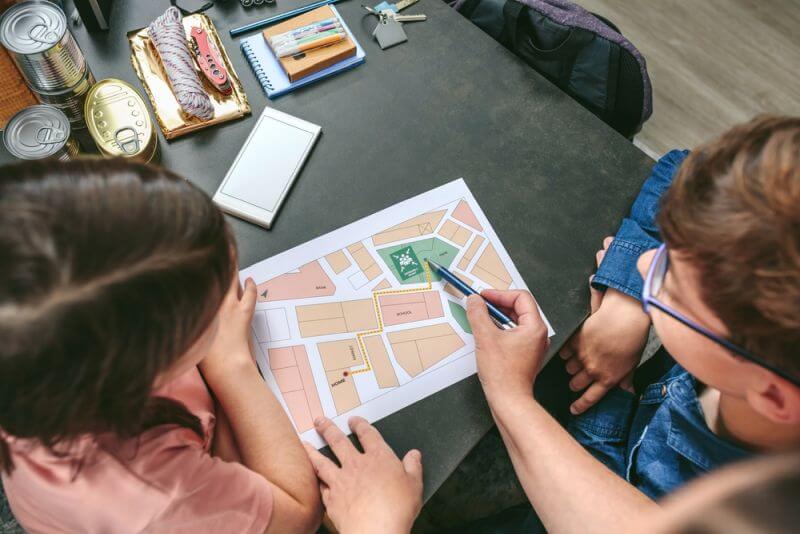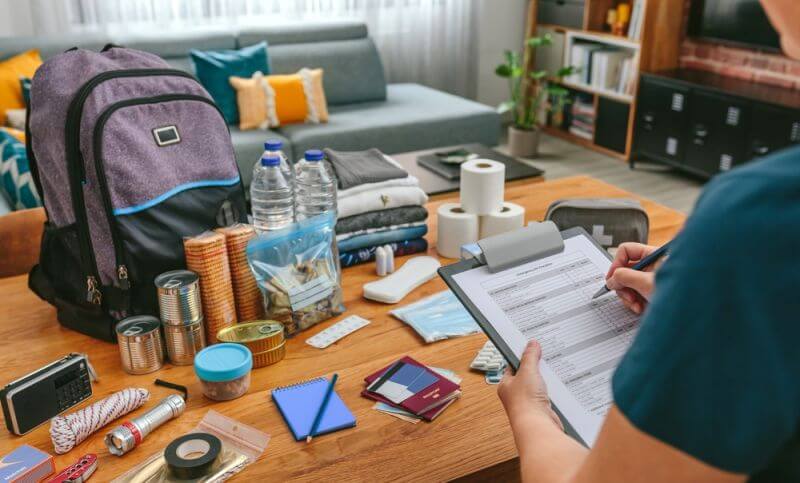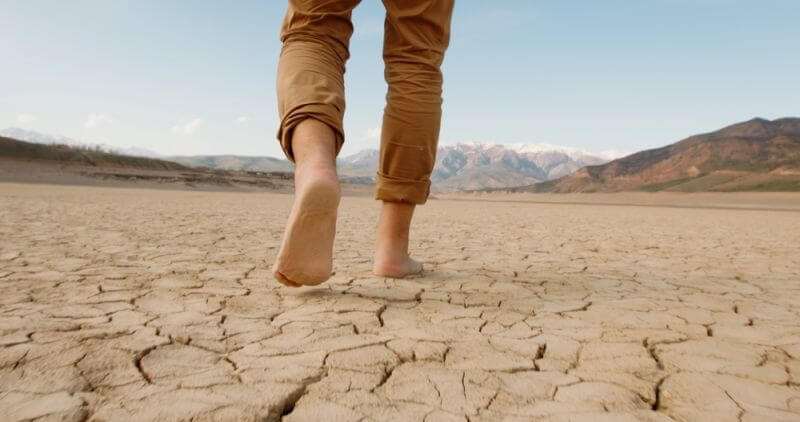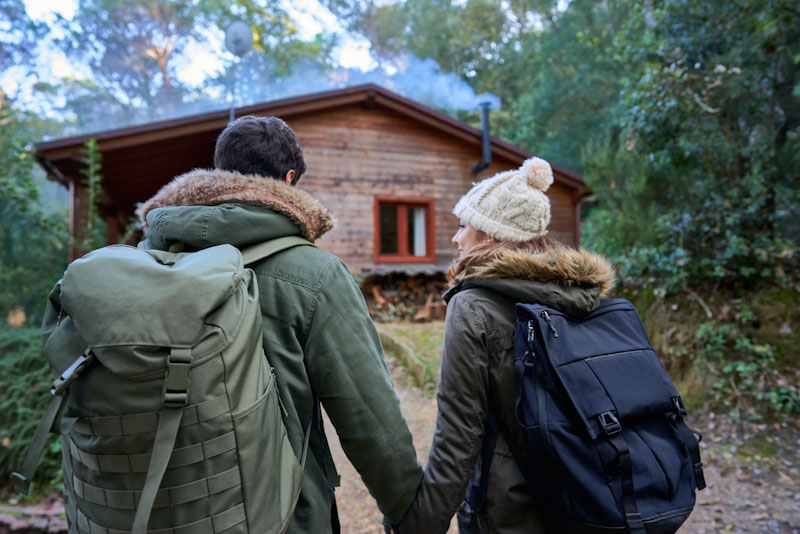From hurricanes and earthquakes to violent social unrest, there are going to be times when it may not be safe or advisable for you to remain in your current location.
Making a decision to stay, or “bug in” versus leaving or “bugging out” to a perceived safer area is not always an easy one. Nevertheless, when a major crisis occurs, you will be faced with that decision from the context of actually being in the situation as opposed to simply sitting back and thinking about what it would be like and what your responses will be. Before you discard either option, it is very important to understand the risks and benefits of each action and the kinds of circumstances that may force you to adjust your plans.
What is the Difference Between Bugging In and Bugging Out?
Bugging In – During a crisis, this means you will stay in your home as opposed to leaving for a place outside of the area under threat. Depending on the situation, you may be forced to bug in even if you would prefer to leave the area. For example, during a State of Emergency, local, state, and federal government officials may demand that all citizens stay in their homes until the emergency is over. Individuals found outside or trying to get through blockades may be jailed or arrested. When it comes to bugging in, your stockpile will be located in your home.
Bugging Out – Either just before, during, or soon after a crisis occurs, you and your family may decide to leave home and travel to what you think will be a safer area until it is safe to return home. In most cases, it is best to bug out before the actual crisis hits. For example, if you suspect riots are going to break out, a hurricane is coming, or something else that carries some kind of warning, it is better to leave early rather than get trapped where you are.
How To Build a Small Bunker in Your Backyard with $400
No matter whether you have to deal with blockades or traffic congestion because of many people trying to flee the area, these problems can be avoided by leaving early. When it comes to your stockpile, it may be divided into caches that you will retrieve as you move towards your destination, while the bulk of your goods will be at the destination. Typically, you will want to travel light and carry only what you need for the journey itself. You will also need a reliable vehicle that can travel off road or in other places where you are less likely to be noticed.
Basic Needs that Must Always Be Met
No matter whether you decide to bug in or bug out, there are six basic needs that you must always take care of:
Shelter
No matter where you are, you must always have adequate shelter. Aside from protecting you from the weather, the shelter must also be capable of protecting you from contaminated air as well as individuals who might try to get in and cause you harm. It is also important to have basic utilities such as sewage removal, incoming water, and electricity.
It is always a good idea to have a shelter with some kind of working fireplace. No matter whether you burn wood, paper logs, or some other material, the heat provided by the fireplace will be necessary for cooking, hygiene, and staying warm in cold temperatures. While you are bugging out, it is also important to keep some kind of portable stove onhand. This may include anything from sterno stoves and propane heaters to candle heaters and rubbing alcohol stoves.
Regardless of where you are, the shelter must also be properly ventilated, especially if you are going to burn any kind of fuel. Even if you are taking shelter in a car, you must be able to vent the fumes out while maintaining any air purification system that may be needed to keep you safe from biohazards, external smoke, or even volcanic ash.
If you will sheltering in a warm climate, being able to lower the temperature is always important. Since this invariably uses a lot of electricity, you should look into passive cooling options such as heavy curtains and other means to prevent heat from the sun getting inside the shelter. In a similar fashion, if you are in an area where there is a high risk of floods, it is important to have sandbags and wood ready to shore up lower levels and board up windows.
Fire
It is very important that you always be able to boil water and cook meals. Depending on where you are, fire can also be a strong deterrent against wild animals. For example, if you are bugging out and must spend time camping, a fire can be your life line in more ways that one. This includes being able to generate fire signals that can be used to get help once you are outside the crisis area, but find yourself in a bad situation.
While a fireplace where you can hang pots, kettles, and other cooking vessels is optimal, don’t overlook BBQ grills or camping stoves. Just remember to keep a good supply of charcoal, charcoal starter, and extra propane tanks on hand. Keep enough on hand to last at least one year. Since both charcoal and propane are good for long term storage, you can also purchase a little at a time and store it away easily enough.
Water
In a time of a social unrest or other disaster, it is likely there will be little or no drinking water available. A human can only live about 3 days before dying of thirst. Store away at least one gallon of water for each person and animal (larger animals will require more) in your care. While there is no upper limit for how much water you should store away, aim for at least a 6 month supply. Avoid storing water in plastic because there is a likelihood that chemicals from it will eventually leach into the water. Be wary of water capture and harvesting systems that use plastic containers. If you are going to use these systems, make sure you know how long the plastic will remain before it begins breaking down and leaching chemicals into the water.
Food
You should always have at least 3 weeks of food onhand. As with water, there is no upper limit. In this case, however, you must always be wary of expiration dates and methods used to process the foods. Now is a good time to build up your food supply and practice good rotation methods so that you are adjusted to the foods you will eat during an emergency. This is also a good time to figure what things you are most likely to eat so that nothing goes to waste.
If something tastes bad or makes you feel sick now, there is no point to storing it away even if it will last a long time. Instead, look for other brands or processing options that give a suitable shelf life and will work for you. Remember, in a time of need, you will need to be at your best. There is no point to stockpiling food that you will wind up leaving on the shelf because you just can’t eat it.
Here are some different foods that you might want to store away.
- Freeze dried or dehydrated foods. Have a long shelf life.
- MREs have a long shelf life and can be eaten hot or cold.
- Store bought cans and packaged foods. Keep an eye on expiration dates.
- Can your own food. Put labels on can goods with date of canning and expiration date.
- Do not forget about storing away foods obtained from hunting and gardening. If a crisis lasts long enough, it is very likely these skills will be very important no matter whether you are bugging in or out.
- It’s very important that your food supply includes foods processed using different methods. This will ensure that at least some of your food will be safe no matter what situation you find yourself in.
Self-defense
In a time of social unrest, looters, rioters, and many others will be desperate to survive. As they put an increasing strain on emergency services, there is every chance that you will be left to defend yourself. Before a crisis occurs, it is imperative that you own firearms and other weapons so that you can defend yourself. It doesn’t matter if you are bugging in or out.
No matter which firearms you choose, be sure to buy plenty of ammunition for each gun. As with water and many other life sustaining resources, the ammo you have onhand will more than likely have to last until the crisis is over and social order is restored. To help stretch the ammunition supply, it will be to your advantage to learn how to reload for all calibers and shotgun gauges that you have onhand or are likely to use.
You should also keep other weapons onhand for times when no ammo is available. There are hundreds to thousands of options in this area. Bows, crossbows, knives, darts, swords, slingshots, chemical sprays, and many other devices may be of use to you. The more diverse your weapons cache, the the greater your skill, the better chance you will have of staving off an attack.
Home Security
Aside from being able to defend yourself, you must also be able to defend your stockpile and your shelter. Home security systems can be of some use if they are built and maintained correctly. Solar powered lights with motion sensors can buy you a few extra seconds to several minutes.
Trail cameras and other surveillance cameras may also be of use as long as they don’t gain interest by people that think you have something valuable to protect. Today, there are many options for concealing cameras that you can control right from your cell phone. This includes doorbell cameras, nanny cams, and dashboard cameras that can be installed just about anywhere and require very little power. Just remember, however, these systems are not perfect and can be jammed or easily avoided if the people in question are determined to get into your home.
Buildings should have doors and windows hardened from attack. Use solid metal doors and door frames that are upgraded with 3”screws. There must be a dead- bolt on all outside doors and an inside mounted door bar for extra security.
Upgrade window locks to the screw in type that use a special key to open or lock them. To keep the windows from being opened more than 2-3 inches, use wood stopping blocks on the inside. For added window protection, install window bars that can be unlocked from the inside. Plant thorny bushes and plants under ground level windows in order to deter unwanted guests. These plants should never be tall enough to someone looking to get in the window.
Use sandbags or even bags of dirt to keep bullets out. Do not forget to make sure that you also keep flammable materials away from windows or other areas where they can be ignited by unwanted visitors. No matter whether you are bugging in or out, you should also consider installing both a panic room and a hidden exit that you can use to escape from the shelter.
First aid
Before a crisis occurs, it is very important to take a good first aid course that covers basic through advanced methods. When you finish all of the courses, take refresher or up dated courses to keep up on new techniques and equipment. It is also very important to have a well stocked first aid kit that includes items you know how to use. Do not forget to keep extra supplies onhand so that you can restock if needed.
Your first aid kit should always include at least 3 – 4 months worth of any medication that you are taking on a long term basis. Always make note of the expiration dates and rotate your stock out each time you fill a prescription. Since essential oils and herbs can also go bad after a period of time, it is also important to pay attention to their expiration dates and replace them as needed.
If there is an item in your kit that you don’t know how to use, do not hesitate to take a course where you can learn what to do. For example, if your kit includes a tourniquet, it doesn’t make much sense to wait for an emergency where you need to apply one. Take the time now to get the proper instruction so that you will make mistakes that can cost a life.
Even though you may not be able to find much in the way of emergency care training for animals, it is still important to keep a first aid kit onhand for livestock and pets. You will need to work closely with your veterinarian during the process of selecting supplies, drugs, and herbs to keep onhand for this purpose. During your visit to the vet, it is also important to ask about how to use first aid supplies, and watch demonstrations if possible.
Pros and Cons of Bugging In
Before you commit to bugging in or out, it is best to have some ideas about the advantages and disadvantages. To begin on the plus side, your home is bound to be familiar territory. You will not need to concern yourself with trying to navigate through a strange neighborhood or dealing with larger numbers of strangers. In the best case scenario, the friendships and connections you have to people around you may be of immense value. Not everyone becomes a panic driven rioter or looter in a time of need. You may even find that being in a small, close knit neighborhood will help deter these kinds of activities.
On the household front, you will be able to store away more items in your own home. Since this is also your dwelling, you will never have to worry about your caches being discovered and stolen by someone else. You have the best chance of protecting your stockpile when you have access to it at all times.
When you bug in, you never have to worry about getting caught up in blockades or dealing with traffic congestion. In a time of need, you will find that people trying to escape can be more aggressive on the roads and create endless problems. To add insult to injury, if there is not enough fuel in the gas stations, you can easily get stuck and unable to reach your destination.
If you find yourself in a bad situation where rioters or looters are out of control, you can, and should be able to set up defensive fields of fire and other protections for your home. This will be much harder in a vehicle as well as in locations that you aren’t familiar with. At the very least, when you are in your own home, you will always have an idea about the kind of materials you have onhand as well as a more detailed knowledge of the structure and how best to fortify it.
In general, you will find it easier to develop renewable energy, water collection, and indoor food production when you are in your own home or have your own homestead. These things are far more difficult to manage while you are bugging out or in transit. If you cannot do these things in a home setting, it is not likely that you will be able to succeed in much more constrained conditions. No matter how much money you spend on portable hydroponic systems or other gadgets, they can easily fail under the kinds of conditions you may face while bugging out.
Finally, bugging in is more than likely the only option you will have if you are unable to travel because of special needs, disability, or budget limitations. No matter whether you have a limitation or a loved one does, it may be easier to stay home and focus on making sure that your shelter and resources can meet as many diverse challenges as possible.
As good as bugging in may look, there are also some disadvantages. First, if you are in a population dense area, the likelihood of mobs, mass riots, and looting will also increase. Having to contend with dozens of people trying to get into your home can be an overwhelming experience. Never nderestimate the dangers of this kind of situation.
Anyone that has sheltered in place during a hurricane can tell you that the problems only begin once the rain and wind pass. Among other things, it may not be possible to get even the most basic supplies in for weeks on end. In some areas, it may take months or even years for any kind of normal supply line to be established. Under these circumstances, friends and neighbors that know you are a prepper with a good stockpile may try to tap you. While you should never let people close to you know about your emergency plans, rest assured they will see that your situation is different than theirs after a time.
One of the most overlooked, yet dangerous problems associated with bugging in revolves around sanitation. No matter whether the municipal sewage system is no longer functional, or your own system backs up, disease from the filth can make you sick very quickly. Remember, once you are locked in place, it may not be possible to leave. No matter whether there is raw sewage flowing into your home, rioters in the streets, or you run out of water, there may be no exit possible let alone a way to get help.
Pros and Cons of Bugging Out
For some people, it is natural and instinctive to think that there has to be someplace safer than a crisis zone. If bugging out appeals to you, then you can already appreciate the diversity of choices for finding safety. Depending on your skills, your bug out plan may be as simple as picking up your camping gear and setting out for the nearest heavily wooded area. No matter whether you live in a city or less populated area, this means that you can also avoid many of the diseases that will occur once social order collapses. Just remember that you must still know how to avoid diseases in nature and the other hazards that come with living in these areas.
Depending on your lifestyle and commitments, you may even be able to leave days or weeks before anything dangerous comes to your area. Aside from that, even if someone was targeting you for looting or theft, you will be gone and harder to locate because you are always on the move.
No matter whether you choose to stick to nature and off grid survival or travel through more populated areas, you will have more resources at your disposal. While you may still get trapped by random events or situations, at least you will not face a certain problem in the area that you are bugging out from.
Even if you have a well stocked destination in mind, or are very good at living off the land, bugging out can still have many limitations. In particular, if you decide to leave a bit on the late side, you can easily be targeted by looters, rioters, or anyone else that thinks you have something they want. Being well armed will not necessarily be a deterrent in this situation, especially if the looters think you have supplies that they want.
When you travel through strange areas, it is easier to have an accident or wind up getting sick. No matter whether your condition or the situation prevents it, you may be unable to return home and to any safety that it may still offer. Overall, because you will be traveling with fewer resources and have less space to work in, the risk of injury and illness will always be greater when you bug out. To add insult to injury, if you are in a very remote area, it may not be possible to get medical care. That being said, you may not be any better off bugging in if the health system collapses in your area. Bugging out may offer a slight advantage in the sense that you may still be able to reach a place of safety and get care in regions not affected by the crisis.
Which Do You Plan For?
A good survivalist will plan for bugging in or bugging out. Even the best laid plans can go terribly wrong. While you may want to focus more on bugging in vs bugging out, it never hurts to make the other option your backup plan. Flexibility is always important. A person that can change from one plan to another will have the best chance of survival. When planning to bug in or bug out, it is best to break the planning stage down into sections and priorities so that you can better manage your budget, time, and skill development. Since there are also times when no amount of planning can help you, it is also very important to be able to improvise. While you may be inclined to buy various devices and gadgets, do not forget about building your own items. This will teach you how to improvise and also help you develop a sense of determination in the face of adversity.
Deciding When To Bug Out Or Commit to Bugging In
It is fair to say that earthquakes, tornadoes, and initial hostile attacks from a foreign nation won’t give you time to bug out to a safer location. Nevertheless, there are many other situations where you can and should be able to recognize the warning signs of an imminent disaster.
Here are some things to look for:
- Police, fire departments, and medical services are all overwhelmed and cannot take on an added burden. In an escalating crisis, members of the emergency services must decide where their services will do the most good. When there is time to respond to secondary problems, they will do so if possible.
- Mobs and rioters have a presence in nearby areas and are moving towards your area. If the riots increase over time instead of decrease, or it seems that police are unable to restore order, you should consider your options carefully. Remember, the greatest danger in this kind of situation is other people. Before you make a decision, you must have reliable information about the nature of the riots and where they are. Use the Emergency Broadcast System. Don’t rely on old or mixed up rumors that can easily mislead you.
- Supermarkets and department stores are low in stock on food and other basic needs. Pay careful attention to the dairy counter, meat, and canned goods. If the shelves are continually sparse or there are constant gaping holes in essential food types, it can point to bigger problems ahead. This is especially important to pay attention to in the event of potential economic collapses.
- Increased drilling and activity in law enforcement and emergency service personnel. While there is always a need for training, you may notice certain increases during times when some kind of problem is expected.
- Rising prices on fuel not related to holidays or changes in fuel blends. Anything that disrupts the flow of goods into an area is bound to drive prices up. When there is a restriction on essential items, it can be permanent or long term. If it is long term, you must be prepared to deal with riots and mobs once the lack of resources becomes obvious.
Making Your Decision
After all of the crisis information has been seen and studied, you will need to make a decision. Do not forget to listen to your instincts even if the information you have on-hand indicates a different choice would be better. Just remember, however, it can be hard to listen to your instincts in these situations because of the stress and fear of the unknown. Take things slowly and remain as calm as possible during the decision process. Invariably, people will see things and evaluate them differently; which can make it even harder if there is a difference of opinion in your group. In the end it will be up to you to decide whether to stay in the area or leave. Once you make that decision, stick to it as best you can and do not look back.
No matter whether you bug in or bug out during a crisis, you will still need to meet the same basic needs. Depending on the surrounding situation and what you are up against, one option may work better than the other. For example, leaving an area about to be hit by a hurricane makes sense for many people. Nevertheless, if you are unable to leave the area, you can still make bug in plans that will keep you as safe as possible until the crisis time passes and order is restored.










Bruce Nefferdorf | September 15, 2018
|
I strongly agree Fred. It is always easier to defend yourself and your assets in familiar surroundings. Also if you are overrun in most cases they will want your food and weapons not necessarily to harm you so have several hidden stashes you can fall back on.
DarrenR | September 21, 2018
|
bugging in versus bugging out.
start off easy: don’t plant yourself in areas that are likely to be problematic in a crisis. if your metro area is a demographic powder keg, move to a place that’s a little bit friendlier to your kind. if flooding is a possibility, move to a location that’s on higher ground. live *above* a dam/lake, not below it. if you plan well in this regard, you likely won’t have to abandon your home in a crisis. call it PRE-bugging out if you wish.
avoid media hype about prepping. it’s easy to think of yourself as a failure in prepping because can’t build a satellite receiver from tree bark. yet you’ll get some decent results if you don’t shoot for perfection in this regard. remember: the media’s part in things is to spread hopelessness and frighten you into submission in a subtle, almost subconscious way.
set your home up for crisis survivability. most of us can’t live 100% off the grid, yet raising a garden can meet a large portion of your household’s food needs, especially when coupled with canning. whether you have it delivered or chop your own: feeding a woodstove all winter lowers your energy bills and keeps you warm even if the power is off for weeks due to an epic ice storm.
study the old school ways as relating to your area. just as the wild lettuce video talks about, our ancestors had none of our so called necessities. no internet. no electricity. no antibiotics.
you may need to bug out, say for a wildfire. yet the chances of such are greatly reduced by the above. and ultimately, when you see what you CAN do, albeit imperfectly, you’ll grow a self esteem and household cohesion that can’t be matched.